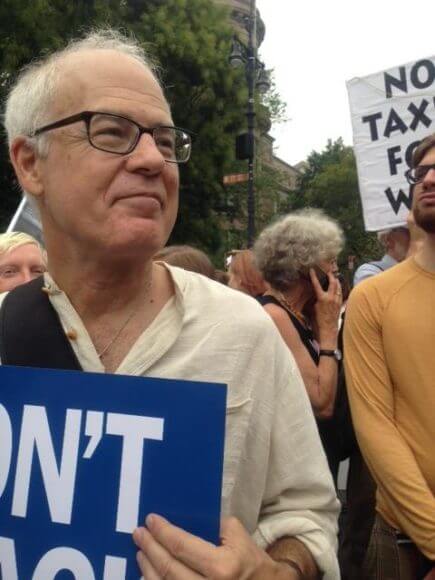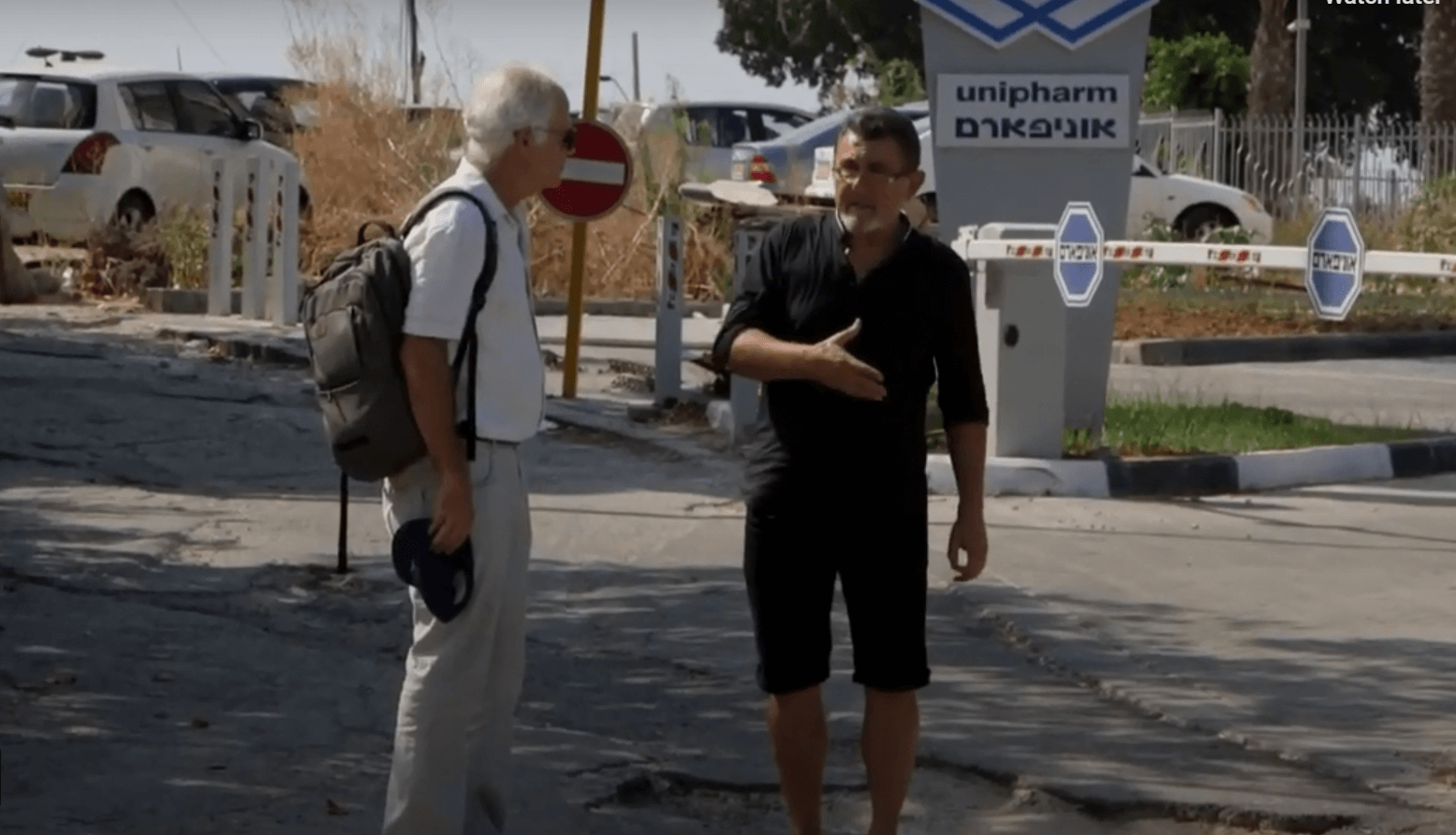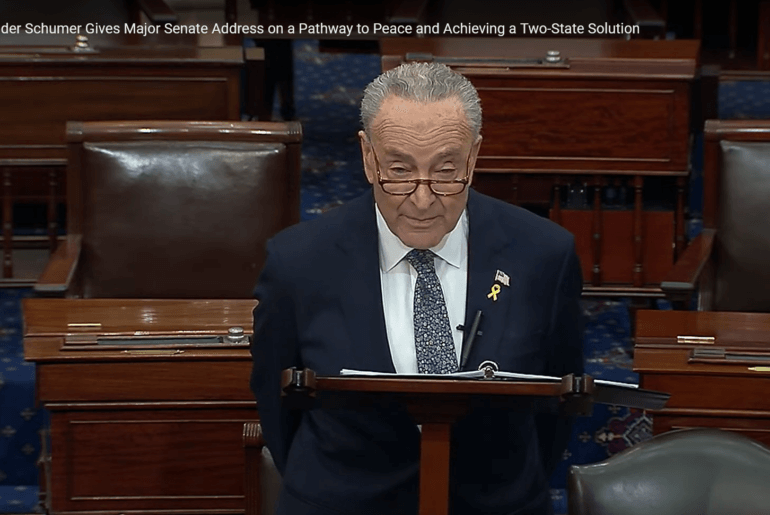Bruce Robbins, an English literature professor and political theorist at Columbia University, has long been active in the effort to bring democracy to Israel and Palestine. His latest effort is a documentary titled, “What Kind of Jew Is Shlomo Sand?” that he publishes today and that is embedded here.
Shlomo Sand is the Israeli author of groundbreaking works on the history of Zionism, notably “The Invention of the Jewish People“, in 2010; and “The Invention of the Land of Israel”, in 2012.
The documentary is colorful, wry, provocative and probing. What happened to the Jews of biblical times after the destruction of the temple? Why are there so many Jews in the world? Sand asks. Robbins is a former tutor of mine in college (and a friend of the site) and I thought to introduce his documentary with an interview. I began by asking him,
Why did you want to do a documentary about Shlomo Sand?
Bruce Robbins: He knocked my socks off when I read “The Invention of the Jewish People”, a year after it was translated. The first thing to hit me was that they lied to me in all those years of Hebrew school. Frankly the thing that I liked best about Hebrew school was Jewish history partly because it didn’t mean actually learning Hebrew and partly because the stories were just amazing. The first day the history books were handed out I brought mine home and read the whole book. I like stories, and ended up making a life out of them. So the fact that the destruction of the second temple in 70 CE was followed by the exile of the Jews by the Romans– I didn’t remember much of that history, but I remembered that.
And it turns out that this seems to be made up! How is it possible that this could have gone unquestioned for so long? Shlomo Sand looked for the sources and tried to track them all down. It wasn’t just that the exile is very very important to the fundamental Zionist narrative of exile and return; but also I had this personal feeling of having been lied to.
That isn’t just: You should support Israel. They are not lying when they say that; that’s their view. I’m free to say I don’t feel like it, Israel should behave better. But when they say the Romans exiled the Jews, it turns out this is a made up story, and I can suddenly see the logic of it. Because what did the Romans want out of the people of Palestine? They wanted people to tend the flocks and grow the grain and grow the grapes and they would take their percentage. They didn’t move in Romans to do that work, wherever they went they got the local population to do it.
How could I have been so dumb as to not question this myself!
The second thing that grabbed me is when he said that the very likely origin of the Ashkenazis is this Khazar kingdom in the 800s. A Turkic people converted to Judaism at that moment when the peoples of the region were trying to decide which monotheism they were going to go with. There is no controversy about that; there are these letters in the Cairo Geniza in which the king of the Khazars says, OK, we’re Jews now, tell us what to do. That’s pretty well documented. Sand argues that these people who were located in what is now Russia are the fundamental source of the Ashkenazi people. I can’t say that I had very strong feelings about this, but my wife loved it. The idea that she could suddenly see in my bone structure and eye shape, people riding across the steppes and shooting arrows and stuff like that– she just found it really interesting. She suddenly could detect in me and my friends, a very different origin than she might have imagined before.
You’re a professor, why didn’t you question the exile myth before?
I’m not a scholar of Jewish history. From the time I went to university, it’s not something I ever studied. There are other things I’m less dumb about. Ask me about Charles Dickens. But this was something that I was carrying forward from early life, that I had not studied, I really did not have any idea what the scholars said about it—but I had never asked myself.
It’s not like you were a Zionist?
No, Sand didn’t convert me at all. My political trajectory is longer. I had made a film some years earlier which is called “Some of My Best Friends are Zionists.” I got into making that film because in 2002 I participated in a campaign circulating an Open Letter of American Jews to our Government and raising money for a full page ad in the Times. It basically took a two-state position– there are rights and wrongs on both sides–but it concluded by saying that if Israel did not abide by the relevant UN resolutions and permit the creation of a Palestinian state along the 1967 borders, the US should cut off all aid. We got about 4500 signatures, and the letter got translated into a number of languages. Then I got invited on a political delegation in 2004 to the occupied territories. Sand didn’t change my politics; it was more my sense of my own identity.
Many have made progress on this issue, over the years. Where were you on the anti-Zionist/non-Zionist Jewish arc when you read Sand?

He didn’t change my feelings about Israel much. What I think and what I thought was pretty much in place. It was more things that had been said to me about who I was as a Jew. I got a certain amount of support from his sense of a kind of secular universalizing heritage, in his case a leftwing heritage, because his father was a communist.
One of the things I discovered when I was working on my first film is how many American Jews, both from Jewish orthodox backgrounds and from serious leftwing backgrounds, were never Zionists. They didn’t have a conversion story to tell me (that’s what I was looking for) because they had been raised in families that just weren’t Zionist at all. That’s not too far from Sand’s story. Of course his family went through hell in Europe, they were in a camp and so on, but he was raised in a leftwing family that was genuinely internationalist that didn’t give itself over to what he would call tribalism. Maybe that’s even the right word for it.
Tell me about your family.

I was raised conservative on Long Island, I was bar mitzvah’d, my parents were not seriously religious in any way, we’d go to the synagogue on the High Holy Days. I had the good luck to have a wonderful rabbi, who was giving sermons against the war in Vietnam really early on, like ‘63, ’64, ‘65 when his congregation did not want to hear it. He gave me the example if you like of a sort of Jewish man of principle, who just said what he felt he had to say, what his conscience told him he had to say. I continued to go the synagogue to talk to him after the bar mitzvah. Samuel Chiel. He just died recently, he was very old. He was wonderful, and he was a very inspiring ethical presence, more than a spiritual presence.
We’re often told to stay away from the Khazar theory, it’s crank territory. What’s your relationship to it?
I hold that thesis a little bit at arm’s length. I’m not qualified intellectually to render judgment on it. I think there’s probably some truth in it and I think there’s probably some limits to it. Instinctively, it feels to me that if Yiddish has a lot more German in it than Russian, say, then probably there was a more complicated moving around, and it wasn’t simple. Not that Sand simplifies totally. There’s a kind of scandal value in saying what he said. The part of it I think is probably right, is that if you were really to go genetic, probably a lot of the genetic material of the ancient Hebrews is in the present day Palestinians– that is people who stayed and probably ended up Muslim. That strikes me as probably right and good to shove in the face of certain tribalists on one side.
But the value of what Shlomo Sand did for me doesn’t depend on the Khazar thesis.
How did he strike you when you met him?
It’s funny, but some part of me, never having seen the guy, would have preferred for him to be a little retired looking. Older and not in such good physical shape, and adorable in that more Central European way. I imagined him more hunched over– like, I have spent my whole life in libraries. Something like that! In fact, he was cool. Clearly a strong public voice who was used to speaking on tv, he’s an active presence in Israel, where he’s a bestseller. The Invention of the Jewish people was on the bestseller list for 19 weeks in Hebrew.
That’s another thing that American Jews need to know. In Israel it’s possible to talk about these things in a much more straightforward way than it is in America. Obviously a lot of the people responded very well to him in Israel. The people who didn’t respond well tended to be experts in the field. As I said in the film, they couldn’t entirely say that what he said was wrong. Because they kept saying, We knew that already. And Sand said, I don’t mind that you knew it already, that means it’s true.

Did you enjoy hanging out with him?
I loved it. It was slightly weird in the sense that I had spent much more time actually on the West Bank than I had ever spent in Israel. Though I do have some Israeli friends. And this was a very strong experience of a particular Israel. I really felt I was among friends, and people who thought much the same way I did. Including His wife Varda who is very impressive and whose family history he gives in the first book.
Who is Shlomo Sand?
He’s someone who cares a great deal about the history he feels he’s part of, of the Jewish people, about the history of his family, but who also cares about the country he lives in right now in the present. And who doesn’t want to let false ideas about the Jewish past interfere with the project of turning Israel into a democracy rather than a Jewish state.
Why are these ideas important now in the U.S.?
Obviously it’s possible to be a supporter as Israel as a Jewish state, that is to say as an undemocratic state, without accepting the full mythology of exile and return. I don’t deny that that’s possible, but I think many Americans have fallen in love with a story which is a story of exile and return. And a story of making the desert bloom and all that stuff which obviously has a lot or resonance for Americans because of the frontier myth and all that.
If everyone knew what Shlomo Sand has discovered about the construction of this story of exile and return, beautiful but false, they would be a little shaken, and I think that would be a good thing. It doesn’t necessarily tell them exactly who they should support and what they should support. I of course hope that American Jews who tend to be liberal– and I continue to believe that there is a kind of secular Jewish identity in America, as long as American Jews continue not voting for Donald Trump—will transfer their democratic values, democratic values we believe in as Americans, will transfer them to Israel. Let’s be democratic across the board. Democratic everywhere!
So you feel that you’ve made amends for having accepted the lies?
One of the things that I discovered first when I did this political campaign in 2002 and then when I made my first documentary is that there are after all a lot of people out there like me, like you—consider the fact that we’re having this conversation. I am connected as a Jew with other Jews in an emotionally very powerful and kind of satisfying way. It has made me think, There are lots of us and we are actually getting our opinions heard in a way that didn’t use to exist, and throwing our weight around, and being heard by people who didn’t want to listen to us not very long ago. Young people are being won over. That’s more than expiation!
Here’s me being a cockeyed optimist. But I really see the views changing in a dramatic and positive way.
Be more concrete.
The fact that a Bernie Sanders could say the things he did about respect for Palestinian rights in 2016 and then again this year and that he could say them in Brooklyn, and the fact that there are lots and lots of people–clearly not enough to make him a viable candidate– but who were willing to listen. He didn’t feel that this would disqualify him coming out of the gate, and it’s true, it didn’t. And while they were still candidates, Buttigieg and Klobuchar saying they wouldn’t accept the AIPAC invitation. Like, who ever would have imagined that?



Let’s cut through this crap once and for all. Even if every single Jew on this planet could trace his/her ancestry back to the ancient Hebrews—-so what? To suggest that the presence of some sort of Jewish political entity in a part of Palestine 2,000 – 2,500 years ago gives every single Jew today the right of sovereignty in Palestine is an insult to the intelligence of any rational person. As the King-Crane Commission of Inquiry, sent to Palestine by US President Woodrow Wilson in 1919 stated “For the initial claim, often submitted by Zionist representatives, that they have a “right” to Palestine based on an occupation 2000 years ago, can hardly be seriously considered”.
‘What Kind of Jew Is Shlomo Sand?’
I don’t care for the title.
People in general do not care what kind of Muslim or Baptist or Jew someone is.
What kind of a man is Shlomo Sand?
Shlomo Sand is an outstanding original thinker and a remarkable scholar, as well as a forceful writer.
I’ve read his two main books, and he tells us an extremely important story.
Here is a review I wrote on the first one. I think it captures the importance of the work:
https://chuckmanmiscellanea.blogspot.com/2011/10/review-of-shlomo-sands-invention-of.html
Who cares what kind of Jew he is when he believes in the totally discredited ‘khazzer’ theory? An idiot is an idiot. Besides the lack of reliable history on this supposed conversion, and the lack of dna, there is absolutely zero trace elements of any Turkic language (roots, names, anything) in any language Eastern European Jews were fluent in, especially Yiddish. In Yiddish there are elements of hebrew, Spanish, Persian, French, German and Latin but no Turkic origins. Sands jumped on the first sensational anti-Israel band wagon he found and took off from there. A typical mediocre minded true believer
Kurt Vonnergut once joked that the National Rifle Association folks were quite right – every American has the right to own a breech-loading musket and a powder horn. Likewise anyone who lives in Israel because it’s the “ancestral homeland of the Jews” should be required to practice Judaism as it was practiced in 800 B.C. – we will have a healthy marked for sacrificial goats. ( https://www.nbcnews.com/sciencemain/animal-sacrifice-temple-powered-ancient-jerusalems-economy-8C11073738 )
Last line is false. Buttigegg and klobuchar refused to speak at aipac? it was supertuesday, so it didnt fit into their schedule.
american jews were not very zionist before the 6 day war. american jews are not very zionistic in the post rabin phase. the arc of the trajectory between 1967 and 1995 is of interest. it is primarily echoes of the past that are primary motivations of the zionist mindset.
how many jews died in the wars between rome and judea in 70 of the current era? no, there was no: tie them up and move them to a new home. there were policies of suppression that encouraged emigration.
i learned in school that somewhere about the year 1,000 of the current era the world jewish population was in the tens of thousands, and the jewish population at the time of jesus was supposedly about 10% of the world population (of the Mediterranean basin), or in the hundreds of thousands if not millions, so i would think that an honest appraisal of who those jews at the time of the nadir of jewish population would be key in truly ascertaining jewish ethnic roots.
the future for people like me, who have always supported israel, but are about to lose the fig leaf of the two state solution, is under a question mark. activism is as much a question of social comfort as it is one of ideology. because of my extensive torah education and extensive time in israel and love for the hebrew language and nostalgia for jewish religious customs i am essentially alienated from the world view of antizionists like the ones expressed here.